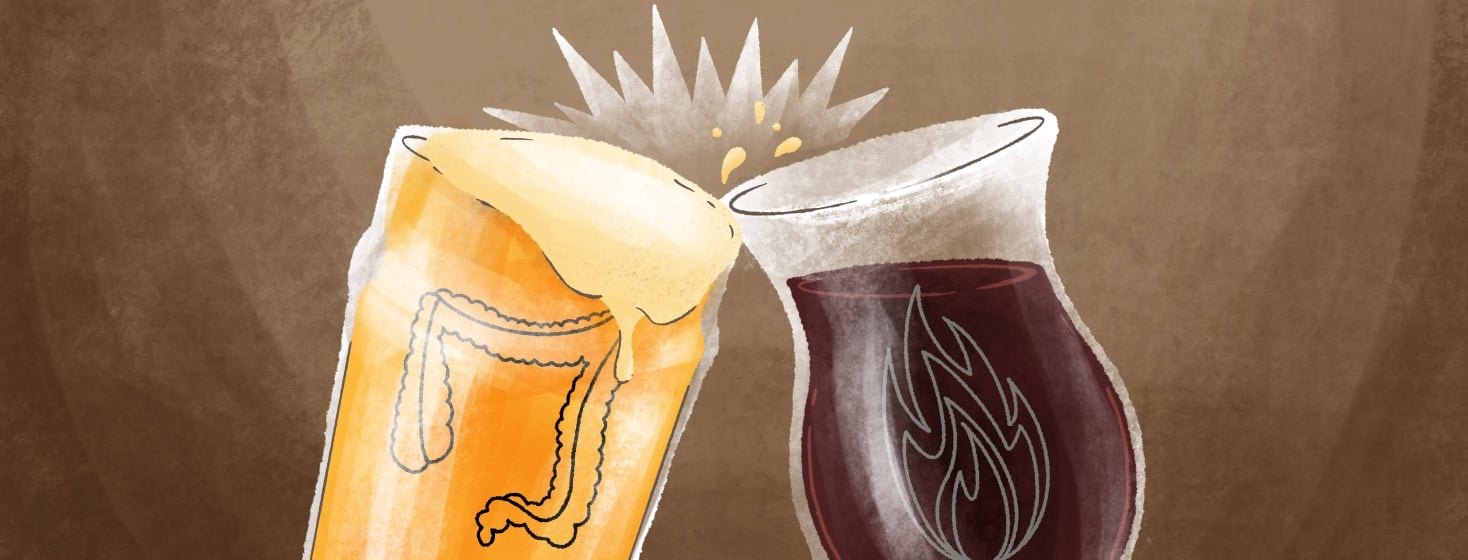My Relationship with Alcohol and IBD
There are so many potential triggers for Crohn's and ulcerative colitis, and one of these is alcohol.
Whilst there's nothing to suggest alcohol consumption causes IBD, many patients report it makes their symptoms worse – whether they're in remission or not.
A study on alcohol and IBD
A study found that there wasn't a huge difference between the alcohol consumption of those with inactive IBD compared to the rest of the U.S. population.1
However, around 75% of people whose IBD was inactive still reported that their gastrointestinal symptoms worsened when they drank alcohol, which compared to around 43% of people with the less serious condition of irritable bowel syndrome (IBS).1
This suggests alcohol certainly seems to cause gastro symptoms in general (since those with IBS also reported an impact) but is heightened in those of us with IBD. The study explains it may be because alcohol can impact your immune system,1 which obviously plays a huge role in our disease, even in remission.
But is it as simple as telling people with IBD just not to drink? I don't think so.
Still choosing to drink with IBD
Despite IBD patients reporting symptoms, they didn't necessarily stop drinking alcohol, with only 38% of people with Crohn's and 37% with ulcerative colitis abstaining from alcohol (which is almost identical to the U.S. population in general).1
It's similar to other triggers: about two-thirds of us with IBD consume coffee and 49% of those think it negatively affects their IBD but they continue to drink it.1 Probably because fatigue is a bitch, am I right?
When I was first diagnosed with IBD 8 years ago, I was convinced I would live the perfect healthy lifestyle to keep the disease at bay. That alcohol wouldn't touch my lips. That I would only eat organic and healthy. For a while, it worked. I've never been much of a social drinker so it wasn't too hard.
However, now I am more realistic. And I know that IBD is part of my life and I am human.
Crohn's and colitis are a balancing act
Ironically, I've never actually liked coffee so that one has been easy to kick to the curb. But on a weekend, when my very energetic two-year-old is asleep, I'll most likely have a glass of red wine.
On a summer's day (rare as they are in England), I may drink a gin and tonic in the beer garden. Alcohol is a massive part of socialising in England but I've never felt compelled to drink much in that way. (Plus, thanks to my son, I don't have much of a social life right now.)
For more, it's something I enjoy and I think I've found that balance, but it is different for everyone. I am married in my 30s, and I can appreciate that someone in their early 20s and in the dating world may be different. They may rely on a drink or two at a date to calm their nerves because dating is HARD.
Identifying whether alcohol is a trigger
There are so many potential triggers when it comes to IBD: stress, lack of sleep, anxiety, diet, medication changes, or even the hot weather. Can we really say we're perfect at managing them all?
Like anything, my relationship with alcohol has been about finding the balance. Whilst I know something like gluten is likely to leave me feeling ill for days, alcohol in small doses is likely to have far less impact. So gluten is just not worth it but a small glass of wine probably is.
We all find our tipping points.
For me, having a drink is worth it
But why take the risk at all? Well, when I was first diagnosed, I was rigorous in my approach to healthy eating, but I was far less happy.
That's because every single day we have to make choices between keeping our lives happy and keeping our disease happy. It is not one I always get right but it's worth acknowledging missteps are okay, too.
Whether that's drinking alcohol, drinking coffee, or staying up far too late, we are all only human and trying to do the best job we can.

Join the conversation